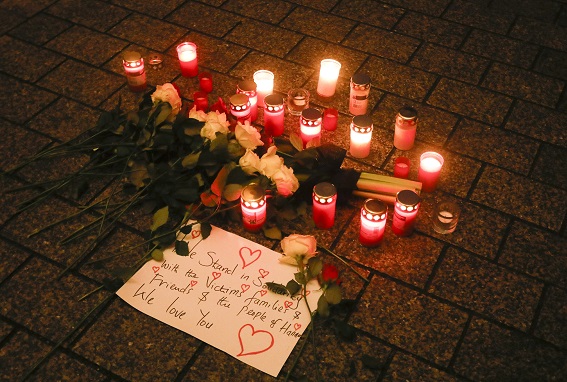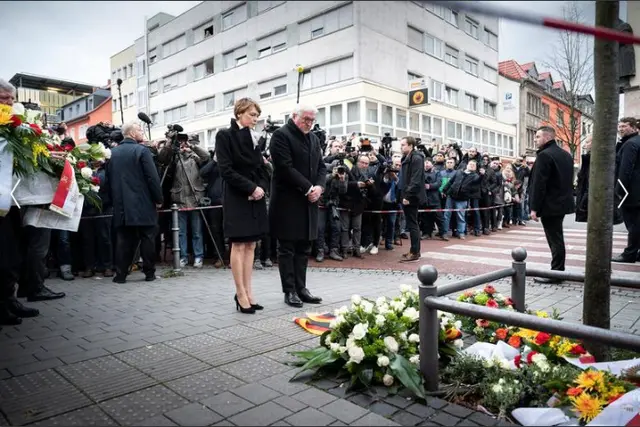Thousands of people took part in vigils across Germany on Thursday after a gunman with apparent far-right beliefs killed nine people at a shisha bar and a cafe in the city of Hanau.
The deaths are being treated by German investigators as an act of far-right terrorism.
The attack has shocked Germany and added to fears that police may still be missing vital clues about violent racists and their networks, despite previous far-right outrages.
Chancellor Angela Merkel condemned the "poison" of racism, as anger mixed with grief over the latest and deadliest attack linked to Germany's extreme right in recent months.
In June 2019, a pro-migrant politician was shot in the head at close range and found dead in his garden. A suspect with far-right links later confessed to the murder. Four months later, an attacker later admitted to a far-right, anti-Semitic motive for an attack that killed two in Halle and was streamed online for 35 minutes.
The Kon-Med association of Kurds in Germany said there were "several victims of Kurdish origin" and criticized German authorities for not taking a tougher stance against "far-right terrorism."
The head of the Social Democrats (SPD), Saskia Esken, described the Hanau crime as far-right "terror" and said, "For far too long we've avoided naming this in clear language."
The National Socialist Underground (NSU), a neo-Nazi cell that murdered 10 people, nine of them immigrants between 2000 and 2007, had remained for a long period below the police radar.
The NSU case was a wake-up call for the authorities, whose anti-terrorism efforts had been focused on the threat from violent Islamists. But some say the authorities are still underestimating the far-right terror threat.
The far-right Alternative for Germany (AfD) – now the main opposition party – has been accused repeatedly of using inflammatory rhetoric, including in parliament. The organization gathered support mainly after 2015, after nearly a million non-EU migrants reached Germany, a move that was portrayed by nationalists as an Islamic threat to German culture.
Condemnation pouring in from across the political spectrum accused the AfD of normalizing hate speech and fomenting anti-foreigner sentiment after the Hanau mass shooting.
AfD parliamentary leader Alice Weidel condemned the Hanau attack as a "terrible act."
The co-leader of the far-right AfD party Joerg Meuthen stood out by saying the shootings were "neither right- nor left-wing terrorism" but the actions of "a madman."

Candles and flowers placed on the floor during a vigil for victims of the shooting in the central German town Hanau, at the Brandenburg Gate in Berlin, Germany, Thursday, Feb. 20, 2020. /AP
But Bjorn Hocke, one of the AfD's most controversial politicians, has used language echoing racist conspiracy theories spread by neo-Nazis, including the "great replacement" – the claim that Jews and liberals want "inferior" races to replace the white race.
German police have identified around 60 far-right adherents as "dangerous" individuals capable of carrying out a violent attack.
Last Friday, they arrested 12 members of a German extreme-right group believed to have been plotting "shocking" large-scale attacks on mosques, similar to the ones carried out in New Zealand last year.
Vigils across Germany
Hundreds of people, many carrying candles or white roses, gathered in silence in Hanau in the evening to show solidarity with the victims.
Large crowds also gathered in Frankfurt and at Berlin's Brandenburg Gate, some carrying signs that read "Take racism personally" or "Never Again!", in scenes replicated across dozens of German cities.
Relatives and friends of the victims gathered at the Arena bar on Thursday, an AFP reporter said, tearfully embracing one another.
"I couldn't be any more upset," said Inge Bank, 82, who lives near the bar.
"We have to nip it in the bud if the Nazi party is coming back," Bank said, adding that she had lived through World War II.
German President Frank-Walter Steinmeier placed a wreath of white flowers outside the Arena bar on Thursday evening before addressing the main Hanau vigil.
Steinmeier, who serves as a moral compass for the nation, condemned the shooter's "brutal act of terror."
But he said he was heartened to see "thousands, maybe even tens of thousands" turning out across the country to honor the victims.
"We stand together, we want to live together and we show that over and over again. That is the strongest way to fight hatred," he said, to the occasional shout of "Nazis Out!" from the crowd.
Elsewhere, the Eintracht Frankfurt football team held a minute's silence ahead of its home Europa League match against RB Salzburg.
(CGTN)
 简体中文
简体中文

